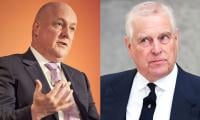Daronomics vs Haqeeqi Azadi?
Shortly after his November 2014 visit to Islamabad, then Afghanistan president, Dr Ashraf Ghani sent his finance minister Dr Omar Zakhilwal to Islamabad to lay out a roadmap for a new economic partnership between Pakistan and Afghanistan.
The first step in this process was for the Afghans to secure Pakistani assent and support in addressing a long list of issues that Afghanistan faced because of things within Pakistan’s control – from customs and tariff impositions to waiting times at Karachi Port and Port Bin Qasim to how truck drivers were treated as they drove up country toward the Chaman and Torkham borders.
There were a total of 46 items on the list of issues agreed between Zakhilwal and his counterpart then, finance minister Ishaq Dar. The idea was simple: Pakistan would address this list and transform the security-centric relationship with Afghanistan into an economic partnership. The long-held dream of Pakistani reformists like me would be realized: a foundational shift in the things we hold dear in our interactions with the rest of the world – trucks, logistics and profits instead of bombs, bullets and coffins (and deficits).
Shortly after those meetings, on December 16, 2014 the Afghanistan-based terrorist group, Tehreek e Taliban Pakistan (TTP), conducted the terrorist attack at Peshawar’s Army Public School. Whatever little trust had begun to develop between Pakistan and Afghanistan evaporated thereafter.
The straight line between security issues and a broken Pakistan-Afghanistan relationship is thick and bloody and easy to see. But it is worth asking what happened to that list of 46 items. A year after the Zakhilwal-Dar meetings, there were still more than forty items on the list. The irritants in the relationship between the two countries always seem to be about terrorism, and cross-border movements of undesirable elements, and security, but the more mundane and boring reality is that Pakistan has a serious functional problem.
Many of the items on that list shape the bulk of the bilateral relationship’s irritants to this day – with the Taliban having replaced the Ghani administration – but the issues and irritants staying the same. Changing how customs, ports, highway authorities and interface staff at key trade nodes behave is not the same as staring down cabinet adversaries or picking up the phone and jumpstarting a notification or SRO or two (or three). When it comes to getting the public sector to coherently respond to macro or even meso-level policy shifts, the Pakistani system just doesn’t respond. This is a function-dysfunction issue.
Why this anecdote is relevant today, nearly eight years later, has to do with Ishaq Dar’s imminent return to Pakistan as one of the most powerful people in Pakistan. Unlike the widely held impression of Dar as a monochromatic vassal of the Sharif Family, the reality is that Dar’s runs as finance minister have tended to be periods during which he has held enormous executive authority – de jure and de facto. Given how laser-focused Nawaz Sharif had been on transforming Pakistan’s relationship with Afghanistan, Dar had all the power and incentive to respond positively to the Afghanistan list. The reason he didn’t is not a commentary on his will or capability; it is a commentary on how difficult it is to get basic things done. Things have only gotten more difficult since 2014.
The decision to bring in Dar feels outrageously irresponsible. There is a difficult IMF programme that needs to be adhered to, there are debt restructuring negotiations that must be conducted; there are unpopular measures in terms of gasoline or petroleum prices that may continue to be required; and there are fiscal measures to take that Dar has a poor track record on. Ishaq Dar is not a tax-the-rich kinda guy. Maybe nobody within conventional Pakistani political culture can be. Certainly, all time Pindi favourites Abdul Hafeez Shaikh and Shaukat Tarin were not. On that count, Asad Umar was certainly better (and maybe partly why he lasted a mere few months as finance minister).
Dr Miftah Ismail’s popularity among a thin corps of the reform-oriented is largely inspired by the directness and honesty with which he approached his role as finance minister. But almost everything he did was, by design, unpopular – and for the ordinary citizen difficult to bear. So at least part of the reason for the change in the captaincy of the economic team in Islamabad is the sheer toxicity of rising fuel prices, high inflation and a record setting run for the dollar – relative to the emaciated, not-so-mighty rupee.
Still, a change in finance minister whilst the country is seeking changes to its key bilateral relationships and how debt obligations within those relationships are structured smacks of instability. And instability is what has spooked markets, especially the holders of Pakistani bonds. Add to all this, the impact of the 2022 floods and the change in finance minister becomes even more inexplicable.
It had taken the PDM coalition government almost five months to figure out how to respond to the domestic and foreign changes that had wrecked the economy – Imran Khan and Shaukat Tarin’s criminal petroleum subsidy, and the Russian invasion of Ukraine – respectively. A six-week delay in dealing with the petrol subsidy was equally criminal on the part of the PDM coalition. But the storms seem to have been weathered enough to leave Pakistan in a position to at least have a fighting chance.
Good news for PM Sharif has been extremely limited and restricted to celebrating the absence of catastrophe: no imminent default on external debt, no large-scale popular unrest, no major breaking points within the PDM coalition. International support may continue to be highly conditional, and winter prices for natural gas may yet put a damper on expectations of lower global fuel prices – but for the most part, the next few weeks may represent the best chance yet for the sitting government to prove that it has some capacity to govern capably.
Ironically, this may be exactly why Nawaz Sharif chose this time to re-insert Ishaq Dar back into Pakistani public policy. With the fires from earlier in the year largely having been put out, the dominant Nawaz Sharif wing of the PML-N believes that Ishaq Dar’s approach to the economy can rebuild the badly damaged political capital of the party, especially in urban Pakistan, and especially in central and north Punjab. This is where the price of the US dollar matters more than it may seem to make sense. This is where the high cost of expensive dollar imports really makes a difference. This is where infrastructure investment creates jobs, and it is where luxury consumption creates consumer satisfaction. It turns out, the Sharifs are a political family, not a reformist gang of policy nerds. But are they any good at this politics thing anymore?
The vote of no-confidence wager’s last leg is Daronomics. But this is a very expensive bet that will test an already broken and dysfunctional governance equation. Dar is not a junior cabinet member that will accept the primacy of Dr Tauqir Shah or even that of the PM. Dar is not a team player that will easily accept or respect the executive autonomy of the Foreign Office or the commerce ministry or the communications division – all key divisions controlled by PDM ministers that are not PML-N and thus not bound by the niceties necessary to operate within the confines of the House of Ittefaq.
Dar is not big on State Bank of Pakistan autonomy either and will closely control monetary and banking policy. Dar is also not a diplomat and does not care for the niceties of how millennials in London and New York expect an important emerging market in ever expanding need of debt instrument deployments to behave.
Most importantly however, Dar is not the anti-Imran Khan. And the consistent blind spot for the PML-N throughout the fiasco of a year that it has had in 2022 seems to be the assumption that the formula for its popularity in the 1990s and early 2000s, even until early in the PTI tenure, remains intact. It does not.
The PML-N’s unpopularity is not anchored in economics, but in the absence of a coherent response to the wider, more overarching, more invigorating vision for Pakistan that Imran Khan represents in the eyes of an increasingly young and frustrated voter.
Does the price of petrol, the US dollar and the inflation rate inform this frustration? Yes.Will Ishaq Dar’s ability to bend those statistics to his will be enough to convince voters not to fall for Imran Khan’s bag of tricks? We are about to find out
The writer is an analyst and commentator.
-
 Meghan Markle’s Family Shares Important News Amid Estrangement
Meghan Markle’s Family Shares Important News Amid Estrangement -
 BAFTA, BBC, And Tourette’s Advocate John Davidson Issue Formal Statements For His Onstage Slur
BAFTA, BBC, And Tourette’s Advocate John Davidson Issue Formal Statements For His Onstage Slur -
 Kanye West's Malibu Beachfront Mansion Enters Controversy Again As Ex-employee Seeks $1M In Alleged Unpaid Wages
Kanye West's Malibu Beachfront Mansion Enters Controversy Again As Ex-employee Seeks $1M In Alleged Unpaid Wages -
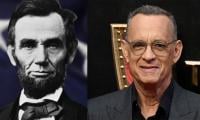 Tom Hanks To Lead Experimental Biopic About Distant Relative Abraham Lincoln
Tom Hanks To Lead Experimental Biopic About Distant Relative Abraham Lincoln -
 'CIA' Starring Tom Ellis Promises Fresh Take Beyond FBI Franchise
'CIA' Starring Tom Ellis Promises Fresh Take Beyond FBI Franchise -
 Congressman Tony Gonzales Faces Resignation Calls Amid Investigation
Congressman Tony Gonzales Faces Resignation Calls Amid Investigation -
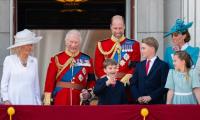 Royal Family Not Allowed To Play THIS Fun Game: ‘It Gets Too Vicious’
Royal Family Not Allowed To Play THIS Fun Game: ‘It Gets Too Vicious’ -
 Heidi Klum Exposes Harsh Modeling Rule She Faced While Expecting
Heidi Klum Exposes Harsh Modeling Rule She Faced While Expecting -
 US Women’s Hockey Team Skips State Of The Union After Gold Medal Win
US Women’s Hockey Team Skips State Of The Union After Gold Medal Win -
 Toronto Weather Forecast: Snow Storm Advisory Lifted After Icy Conditions
Toronto Weather Forecast: Snow Storm Advisory Lifted After Icy Conditions -
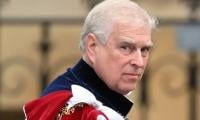 How ‘deafness’ In Andrew Scandal Has Changed Monarchy ‘forever’
How ‘deafness’ In Andrew Scandal Has Changed Monarchy ‘forever’ -
 Gisele Bundchen Drops Postpartum Workout Secret She Calls A 'game Changer'
Gisele Bundchen Drops Postpartum Workout Secret She Calls A 'game Changer' -
 1 In 5 Teens Exposed To Unwanted Sexual Content On Instagram, Report Finds
1 In 5 Teens Exposed To Unwanted Sexual Content On Instagram, Report Finds -
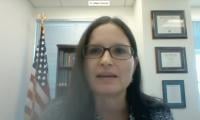 US Judge Aileen Cannon Issues Permanent Order In Trump Documents Case
US Judge Aileen Cannon Issues Permanent Order In Trump Documents Case -
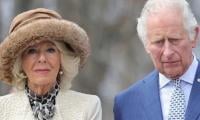 King Charles, Royals Are Not ‘bright’ Enough To Live In Mansions
King Charles, Royals Are Not ‘bright’ Enough To Live In Mansions -
 'Final Throw Of The Dice': Paramount Submits Highest Bid Offer To Warner Bros. In Last Round
'Final Throw Of The Dice': Paramount Submits Highest Bid Offer To Warner Bros. In Last Round


